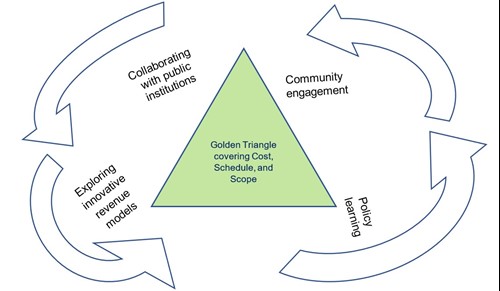A new paradigm for managing low carbon infrastructure projects
29 Nov 2021 02:00 PM
Blog posted by: Abhijeet Acharya, 29 Nov 2021.

Low carbon infrastructure projects require project managers to be outward-looking, adaptive to changes, and socially engaged to overcome issues external to project boundaries. A new paradigm for managing low carbon projects will help project professionals address challenges that are not evident in traditional construction projects.
Many countries, including the UK, have stepped up their efforts to mitigate climate change by setting an ambitious net zero target. This is about reducing greenhouse gas (GHG) emissions and offsetting hard to treat GHG emissions with natural or engineered carbon sinks. Net zero infrastructure projects require a public-private partnership to bring in private investments and a new approach to overcoming complex social-technical challenges like climate change. According to PwC report published in 2020, low carbon infrastructure projects in the UK attracted private investments of around £20bn in 2019; and with the net zero target in place, the estimated private investment of £40bn per year is required until 2030. In October 2021, the UK Government proposed a net zero strategy leveraging private investment’s potential. Their net zero strategy estimates an annual private investment of around £50 to £60bn through the late 2020s and 2030s. Such a high investment brings new business opportunities for private organisations and motivates them to transform themselves into carbon neutral organisations.
So how do we manage these new low carbon opportunities which come with different kinds of challenges? For project managers who come from traditional construction project backgrounds, it can be a concern. In low carbon projects, we must be aware of the evolving policy landscape, explore new revenue models, understand the dynamics of public-private partnerships, and engage with local communities to add social and economic values.
In the traditional project management approach not much attention is given to sustainability related attributes required for managing and leading projects. Project managers with a traditional approach could fail to create new values particularly in complex low carbon projects as they have limited visibility on external factors. A dynamic and engaging environment emanating outside project boundaries forces project professionals to adopt a new project management approach. Over the next two decades, private organisations, consultants, and businesses are expected to play a crucial role by involving themselves through new investments and innovative solutions to overcome the social and technical challenge of achieving net zero targets. Therefore, project managers should make a paradigm shift in their project management approach.

The figure above is the proposed conceptual model for managing low carbon infrastructure projects, explained below.
Policy learning
Governments use policy instruments to promote and push sustainability development projects, so the success of such projects depends on policy actions from multiple government departments. Low carbon projects have been a victim of frequent policy changes and adversely impacted by policy interactions from various departments. As a result of policy interactions, a policy change in one department could often create an unfavourable situation in projects related to other departments. For example, biogas from waste projects’ economic viability can be impacted due to changes in waste collection regulation.
Additionally, with the net zero target in place, the UK aims to gradually extend the carbon price regime to cover more sectors, including transport, building, and heavy industries. Therefore, it’s pertinent for project managers working on low carbon projects to understand low carbon policies and their impact on projects, and develop a mitigation strategy to overcome potential challenges.
Exploring revenue models
To reduce the burden on public funds and infuse innovation, since 2015, the Government withdrew subsidies on renewable energy projects and supported lowest bidders with Contracts for Difference mechanism. This arrangement provided new opportunities for private developers to set up low carbon infrastructure on a build, own and operate basis. Such arrangements saw rapid decarbonisation of the UK’s energy sector. However, these projects pose a challenge to project managers, forcing us to explore and develop revenue models which are competitive and self-sustaining on a long-term basis. As project managers, we must ensure strategic partnerships with technology providers and financial institutions to explore innovative revenue models.
Collaborating with public institutions
The public-private partnership (PPP) model has emerged as a contemporary route to deliver low carbon infrastructure projects in many countries, including the UK. Although PPP models are effective in addressing complex social and environmental issues such as climate change, they come with challenges. In PPP models, we as project managers often face issues related to slow decision making and unrealistic risk transfer. But on the other side, as project managers, we must explore opportunities to develop a bottom-up solution in collaboration with local city councils and municipal bodies.
Community engagement
The social perspective is a critical element of low carbon projects; these projects are developed with the social and economic benefits of local communities in mind. Community engagement has emerged key success criterion in adding new values to projects. Local community involvement at the early stage of the project helps project managers to understand their needs and identify new opportunities to add social and economic values. Additionally, community engagement helps project managers identify any roadblocks at the initial stage of the project that could lead to schedule and cost overrun. As project professionals, we must engage with local communities who are the ultimate beneficiaries of such projects.
Building on the above discussion, project professionals must consider new ways to deal with external factors influencing the project outcome. In addition to the golden triangle, fundamental to project management practice, we need to focus more on evolving policy landscape, exploring new revenue streams, developing strategic partnerships, and engaging local communities to create new values that will help us deliver low carbon projects.
You may also be interested in
About the Author
Abhijeet Acharya
Abhijeet is an APM member with over 25 years of project execution in the energy sector. He is also an active researcher on energy transition challenges and opportunities. He has published papers related to energy policy, carbon pricing, PPA (Power Purchase Agreement) model, community energy, and waste-to-biogas scheme in peer-reviewed journals.